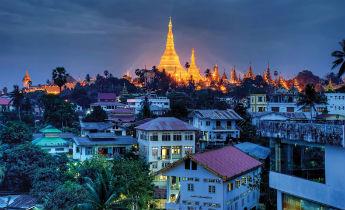FDI poised to flow on Myanmar's political transition
(
MENAFN- Asia Times) Yangon skyline
Once isolated under the regime of a military junta Myanmar has made great strides in development under quasi-civilian rule. The country's historic elections which delivered a landslide win to Nobel Laureate Aung San Suu Kyi's National League for Democracy did not give Myanmar a new president. Parliament will choose their leader this year and after the new administration takes over investors may again swarm on Myanmar. 'Once the government is in place we’ll get another upsurge of people coming in on a look-around basis' Myanmar Centre for Responsible Business director Vicky Bowman told Asia Times. 'Whether that will then materialize into FDI is so dependent on the global economic situation and the cost of doing business here in terms of issues around infrastructure energy to some extent labor and certainly land.' Seeking signals Myanmar has seen billions in foreign investment recently despite concerns about how the election would come off. A US embassy spokesperson said many foreign companies waited to see how the polls went and were now eyeingthe transition and policies of the new government as they make investment decisions. More FDI expected
'A smooth transition to a democratically elected government would send a welcoming signal to foreign investors' the spokesperson said in an email. Meanwhile the Myanmar administration hoped the future would help assure investors. “I am optimistic” Myanmar Investment Commission secretary U Aung Naing Oo told Asia Times in an e-mail. “The political transition will create more investor confidence that will result in the promotion of FDI.” Foreign direct investment for 2014-2015 cleared $8 billion pinned to telecoms and oil and gas streaming past goals set by the government. U Aung Naing Oo said the amount represented pledges with about half actually coming into the country. Meanwhile FDI totals reached more than $54.2 billion between 1988 and last year according to data from the Directorate of Investment and Company Administration (DICA) and U Aung Naing Oo estimated international investment aims for the current fiscal year at $6 billion. Telecoms popping Myanmar's telecoms sector has undergone a sea change with penetration jumping from about 10% in 2013 to more than 60% in 2015 according to the government. The administration's decision to liberalize the sector and bring in international competition for state-owned incumbent Myanmar Posts and Telecommunications (MPT) has seen the masses go mobile through cheap handsets and cheaper SIM cards which once cost thousands of dollars but now run customers 1500 kyats ($1.16). Myanmar going mobile
Two foreign telcos Qatar's Ooredoo and Norway's Telenor switched on services in 2014 and have since gained millions of subscribers. Their industry has seen hefty foreign investment with a government-drafted master plan for the sector putting telecoms FDI since 2013 at more than $2.8 billion and U Aung Naing Oo predicts it will 'keep going strong.' He said that in fiscal year 2015-2016 the top sectors for foreign direct investment will be infrastructure development off-shore natural gas and manufacturing. “[It’s] still difficult to predict but manufacturing businesses in Thilawa Special Economic Zone will be increasing. Other areas would be new ports at Dawei and Kyauk Phyu SEZs dry ports and new airport projects – Hanthawaddy International Airport – and real estate projects in Yangon” he said. Bowman meanwhile forecasts interest in the garment sector services and banking although she adds in the last case that further liberalization is required for foreign companies to come in. Though the country has progressed on reforms major institutional issues such as land rights continue to confront foreigners looking to invest in Myanmar. And some activities such as importing jade and working with specially designated nationals are outlawed for American investors under lingering US sanctions. U Aung Naing Oo said sanctions were definitely a key obstacle for FDI promotion. 'I strongly hope that [they] will be removed in the first half of 2016' he said. But Bowman said sanctions were 'at the very margins' as they struck some potential partners off limits and impacted banking as do OECD anti-money laundering requirements and some banks' risk-averse attitude toward Myanmar. Other challenges include getting enough skilled labor and the absence of a reliable power supply as well as legal stability said Bowman. Besides that there are macroeconomic factors to consider. Myanmar's kyat has recently depreciated which U Aung Naing Oo said had an effect on business. And the country does not exist in a vacuum. 'One word of caution with all the euphoria' Asian Development Bank country director for Myanmar Winfried Wicklein told Asia Times. 'There is obviously an impact of the global economy on investors whether China or oil prices.' Catherine Trautwein is a business journalist based in Yangon. (Copyright 2015 Asia Times Holdings Limited a duly registered Hong Kong company. All rights reserved. Please contact us about sales syndication and republishing.)
Legal Disclaimer:
MENAFN provides the
information “as is” without warranty of any kind. We do not accept
any responsibility or liability for the accuracy, content, images,
videos, licenses, completeness, legality, or reliability of the information
contained in this article. If you have any complaints or copyright
issues related to this article, kindly contact the provider above.




















Comments
No comment